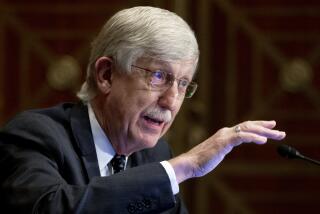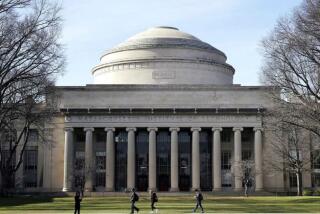U.S. Declines to File Charges in Tobacco Probe
- Share via
As part of its wide-ranging criminal probe of the tobacco industry, the Justice Department has decided not to prosecute an indoor-air consulting firm that critics say acted as a secret front in the industry’s global fight against public smoking bans.
In a one-sentence letter, the department said it had “closed the file” on Healthy Buildings International after considering “the evidence presently available to us and the standards of proof applicable in a criminal case.”
The letter, signed by Mary C. Spearing, chief of the department’s fraud section, was released by lawyers for HBI.
“HBI cooperated in every possible way . . . precisely because we thought there were no facts that could lead to a conclusion that HBI had done anything fraudulently,” HBI lawyer Marc Efron said Wednesday, adding that he was “pleased to see that the Department of Justice appears to have agreed.”
Still pending is a civil whistle-blower suit against HBI, in which a fired employee accuses the Fairfax, Va., firm of defrauding federal agencies that hired it to inspect government buildings for indoor pollution. HBI has denied the claim.
But the Justice Department decision somewhat narrows the scope of the wider tobacco probe.
Although largely overshadowed by tobacco’s other problems--a flood of multibillion-dollar suits and the battle over regulation by the FDA--the criminal investigation is continuing before federal grand juries in Washington, Brooklyn and Manhattan. Prosecutors in recent months have subpoenaed industry documents and have called executives to testify.
The probe has focused on whether tobacco firms violated laws against making false statements to government agencies; failed to make required disclosures to shareholders about potential legal liability; and fraudulently used the Council for Tobacco Research, a putatively independent scientific organization, to advance their legal and public relations goals.
The investigation also concerns whether top industry executives committed perjury when they testified before Congress in 1994 that nicotine was not addictive. Industry executives have denied any wrongdoing.
Prosecutors declined to comment Wednesday, but Cliff Douglas, an anti-tobacco lawyer and special counsel to Rep. Martin Meehan (D-Mass.), said he believes that “the investigation has reached a point of no return and will be seen through to the end.”
After Meehan filed the original request for a perjury investigation, Douglas submitted a 111-page memo to the Justice Department outlining other potential grounds for prosecution.
The HBI probe followed disclosures that the tobacco industry, starting in the mid-1980s, funneled millions of dollars in contracts and subsidies to HBI, transforming a tiny business into a giant in its field and enlisting its aid in the worldwide war against smoking bans.
HBI executives--whose extensive tobacco ties were first disclosed by The Times in 1992--maintained in scores of interviews and legislative testimony that secondhand smoke is an overrated problem and, as a visible contaminant, actually is a useful marker of poor ventilation. Philip Morris annually spent hundreds of thousands of dollars to produce a glossy house organ for HBI that was translated into eight languages and distributed worldwide to promote the firm’s views on indoor pollution--without mentioning the tobacco firm’s involvement.
Prosecutors affirmed their interest in HBI last April, when they got a six-month stay in the whistle-blower trial, then about to begin. In October, prosecutors, without explanation, suddenly moved to lift the stay.
Nonetheless, Justice Department officials told The Times the probe was continuing. However, after several requests from HBI lawyers for written clarification, the letter, dated Nov. 26, pronounced the case closed.
More to Read
Sign up for Essential California
The most important California stories and recommendations in your inbox every morning.
You may occasionally receive promotional content from the Los Angeles Times.













